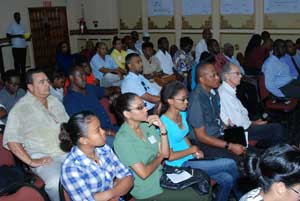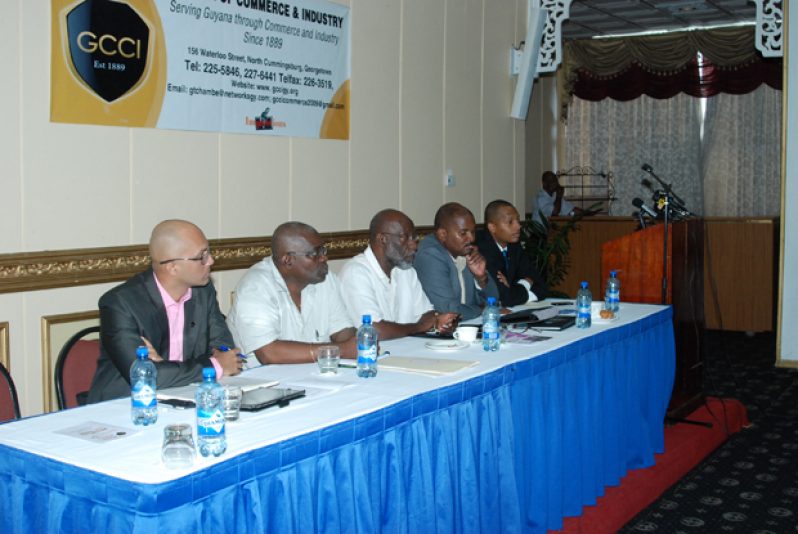“CALLING (Local Government) elections is outside of the remit of GECOM,” according to Chief Elections Officer of the Guyana Elections Commission (GECOM), and Commissioner of National Registration, Mr. Keith Lowenfield, on Tuesday at the Pegasus Hotel in Kingston, Georgetown, as he addressed the gathering of a public forum on the Local Government System in Guyana.
 Lowenfield said GECOM’s responsibility, as defined by the Local Elections Amendment Act, is to provide an effective election system by implementing laws which ought to guide the operations of such electoral processes in order to ensure the smooth delivery of results.
Lowenfield said GECOM’s responsibility, as defined by the Local Elections Amendment Act, is to provide an effective election system by implementing laws which ought to guide the operations of such electoral processes in order to ensure the smooth delivery of results.
He said that information available on the constituencies in relation to the amount of votes, polling stations, and logistics of polling show the preparedness of the agency to facilitate local government elections.
The forum was hosted by the Georgetown Chamber of Commerce and Industry, and those at the head table included Senior Vice-President of the GCCI, Mr. Vishnu Doerga; Chief Elections Officer and Commissioner of National Registration of the Guyana Elections Commission (GECOM), Mr. Keith Lowenfield; GECOM Commissioner Mr. Vincent Alexander; President of the GCCI, Mr. Lance Hinds; and Immediate-Past President of the GCCI and Founder of BLUE Caps, Mr. Clinton Urling.
In his presentation, Lowenfield noted funding for the elections agency, which has already been approved by the National Assembly, would be utilised to operate the agency to support local government elections. He said that funding would be released only if word is given by the relevant authorities to the Chairman and Commissioners.
VOTERS LIST
Once funds earmarked for GECOM have been released, he said, the issue of conducting claims and objections would be examined, including the issue of persons seeking transfer from one polling district to another, claims to be placed on the voter’s list, and claims made for corrections and changes made on National Identification Cards.
“For all those persons who would have made a claim, especially if they are new (to the voting system), we [GECOM] administratively seek to ensure that, on our list, there is only one Keith Lowenfield, and that there is no duplication,” the Chief Elections Officer asserted.
He pointed out that such activities are time-bound because of the extensive amount of training needed for effectiveness at both the level of the Neighbourhood Democratic Councils (NDCs) and the Municipal level, which would take some 28 days for actual operation.
“We need to understand fundamentally what is required, [and] we need to understand that some activities can be done concurrently,” Lowenfield said of the preparedness process. He added that the operations will then move to constructing the official list of voters (OLE), which must satisfy the legal and statutory requirements. These steps, according to the Chief Elections Officer, pave the way for bringing into action the making of sensitive materials like ballots.
BALLOTS
“We cannot print ballots in any constituency or NDC until after nomination day. it is only on nomination day that we will know that my friend wants to be involved; and based on all those who would have satisfied the criteria, we move towards the production of ballots,” he said, asserting: “It cannot be done beforehand.”
Lowenfield iterated, “When we speak to a period of being ready, we need to understand the administrative and statutory arrangements that must take place.
“The Chief Elections Officer must ensure they are complied with.”
Lowenfield said GECOM does not want to run afoul of the law by operating outside of the legal framework that has been established. He urged for immediate recognition of the dynamics that are involved in the active pursuit of office for councillors in the municipality of Georgetown.
“Candidates must be identified before we structure the ballot that speaks to Proportional Representation (PR) and [those that] speak [to] the issue of First-Past-The-Post (FPTP),” Lowenfield said.
He said the process is calculated, and ought to work within the framework of the laws; and there are administrative arrangements that should be observed in order to ensure that electors can exercise their franchise according to their desire.
Written By Derwayne Wills



.jpg)








